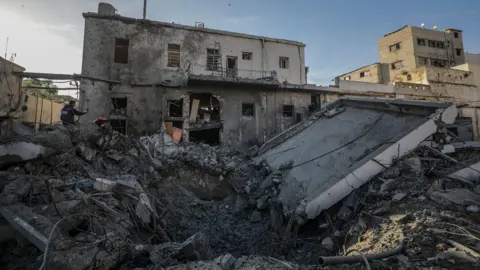Gaza Hospitals in Dire Condition Following Israeli Air Strikes, WHO Reports

The World Health Organization (WHO) has issued a stark warning regarding the deteriorating conditions in hospitals across Gaza, describing them as "beyond description". This alarming statement follows a significant incident where an Israeli airstrike rendered the al-Ahli hospital in Gaza City non-operational. Dr. Margaret Harris, a spokesperson for the WHO, conveyed to the BBC that the organization is witnessing relentless attacks on healthcare facilities, which are compounded by critically low medical supplies due to an ongoing blockade imposed by Israel.
On Sunday, staff at the al-Ahli hospital reported that an Israeli strike had destroyed its laboratory and severely damaged the emergency room. While no direct casualties were reported from the strike itself, a tragic incident occurred where a child lost their life due to disruption in medical care caused by the attack. The Israeli military justified the strike, claiming it targeted a "command-and-control centre" utilized by Hamas for orchestrating its attacks.
The al-Ahli hospital is operated by the Church of England, whose bishops expressed profound grief and outrage over the attack, standing in solidarity with the Palestinian people. They have called upon Israel to substantiate its claims regarding the hospital's alleged use by Hamas for military purposes.
Since the resumption of hostilities in Gaza four weeks ago, after a brief ceasefire, Israel has intensified its air and ground military operations, asserting that such actions are necessary to compel Hamas to release hostages still held in captivity.
On that fateful Sunday night, the al-Ahli hospital was struck by two missiles, marking the fifth time it has been targeted since the onset of the conflict. According to reports from the Anglican Diocese of Jerusalem, the two-storey genetic laboratory was completely destroyed, and significant damage was inflicted on the pharmacy and emergency department buildings. Several surrounding structures, including St. Philip's Church, also sustained damage. The diocese reported that the Israeli military had provided a brief 20-minute warning to evacuate before the assault, but tragically, this limited time contributed to the unfortunate death of a child who had previously suffered a head injury.
Later, Dr. Tedros Adhanom Ghebreyesus, the WHO's Director General, informed that al-Ahlis director revealed the full extent of the damage: the emergency room, laboratory, and pharmacy were all devastated, forcing the hospital to transfer 50 patients to other facilities. Unfortunately, due to the critical state of 40 patients, they could not be moved. Dr. Ghebreyesus emphasized the importance of protecting healthcare facilities, stating, "Hospitals are protected under international humanitarian law. Attacks on health care must stop. Once again we repeat: patients, health workers, and hospitals must be protected."
In response to the airstrike, the Israeli foreign ministry defended its actions, describing the operation as a "precise strike" aimed at a single building used by Hamas, asserting that no medical activities were taking place at the time. They emphasized that an early warning was issued and asserted that the attack was conducted in a manner intended to minimize further damage to the hospital compound, which remained operational for continued medical treatment.
Hamas has vehemently condemned the strike, labeling it a "savage crime" and rejected the Israeli claim that the hospital had been repurposed for military use.
On Monday, the Church of England's House of Bishops released a statement voicing their dismay that hospitals have become battlegrounds amidst the ongoing conflict in Gaza. They further urged Israel to provide credible evidence to support its assertions regarding al-Ahli's alleged military use. The bishops called for an independent and thorough investigation into the attack and highlighted the limited time given to evacuate as a violation of fundamental human rights and dignity.
Dr. Rik Peeperkorn, a WHO representative, warned that the ongoing inability of al-Ahli to accept new patients due to the damage would severely impact trauma care. He noted that al-Ahli was a crucial trauma hospital serving the region north of Wadi Gaza, the only facility with a functional CT scanner in that area, which has been designated as a "no-go" zone by Israel. Furthermore, the charity Medical Aid for Palestinians quoted Dr. Ahmed al-Shurafa, an orthopedic surgeon at al-Ahli, who stated that the level of care provided to the remaining 40 patients was akin to that of a hostel. He lamented, "We are unable to perform any surgical procedures, as these patients require laboratory diagnostics, pharmacy support, and emergency referrals in case of complicationsall of which have ceased entirely due to the recent attack."
























